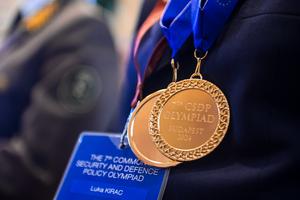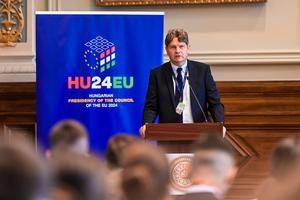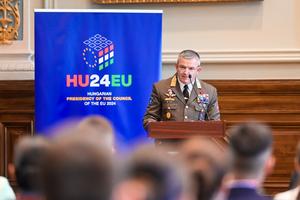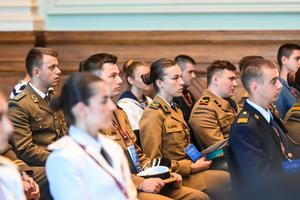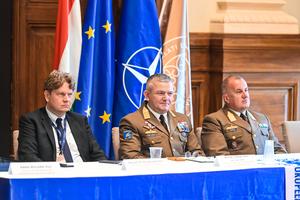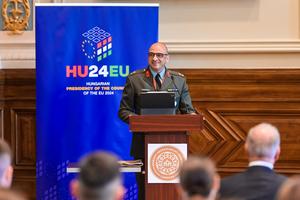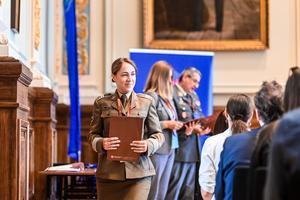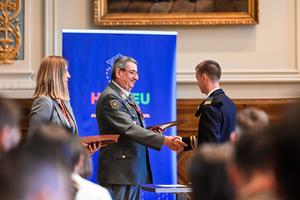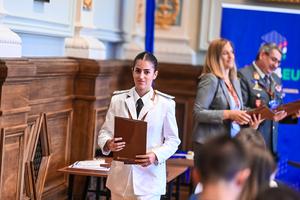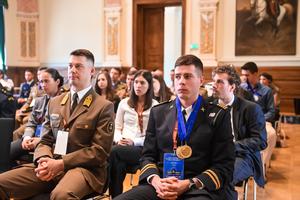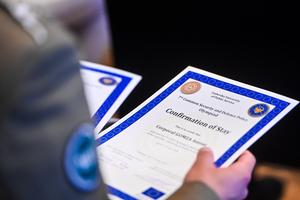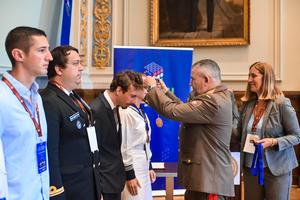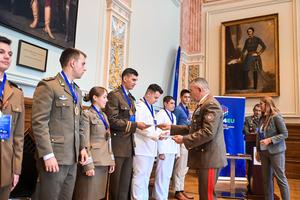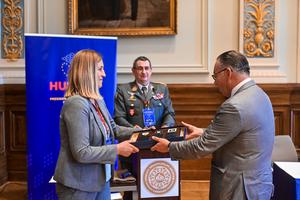The future military officers of various member states of the European Union lined up for an awards ceremony at Ludovika University of Public Service: the 7th Common Security and Defence Policy (CSDP) Olympiad came to an end on Thursday.
This year the Ludovika University of Public Service hosted the 7th CSDP Olympiad, which was the first official event of the Hungarian Presidency of the Council of the European Union. The awards ceremony of the competition was held in Széchenyi Ceremonial Hall of the Ludovika Main Building.
Professor Anna Molnár, Head of the Department of International Security Studies welcomed the attendees of the ceremony, then Balázs Péter Molnár, Deputy State Secretary for EU Policy of the Ministry of European Union Affairs, who is also responsible for the operative tasks of the Hungarian Presidency of the Council of the European Union, opened the event. In his opening speech he highlighted that the power of the European Union lies in knowledge sharing, relationships and innovation even in times when the security environment changes so much as in our days. He added: he appreciates the efforts of the participants at Ludovika Campus, Budapest, in the heart of Europe, which contribute to making our continent a more secure place.
Brigadier General Péter Lippai, Dean of the Faculty of Military Science and Officer Training, emphasised in his welcoming speech that knowledge and relationships added form a tool which is crucial in the life of the military officers of the future. The reason is that team work creates community, cohesion, empathy. The dean also added: it was nice to see how the creativity, preparedness and capability for cooperation of the participants enabled them to tackle even the hardest tasks. Europe will be in good hands, said the Dean, and the friends made at the Olympiad will serve as a firm basis for meeting the challenges of the future.
Finally, Major Christoforos Christoforou from Cyprus talked about the origin of the international security policy Olympiad, underscoring that the cadets, who will soon become officers, cannot be successful only within their national borders. As security challenges go well beyond national boundaries, he could confirm Péter Lippai’s conclusion that the decision-makers of the future must get to know one another in order to be able to collaborate.
Colonel Harald Gell expounded the results of the Cadets’ competition at the awards ceremony, which former Minister of Defence Colonel General Tibor Benkő also attended. Colonel Gell said that everything was perfectly organised in the past few days, for which he expressed his profound gratitude to the organisers. The participants each received a certificate of attendance from the Colonel. The Dean of the Faculty of Military Science and Officer Training handed over a medal for the design of the cover page competition of the book of essays, which contains the best ten essays. This year, it will contain, among others, essays by two Hungarian students, Áron Bálint and Gréta Kiss. The winner of the cover page competition was Gabriele De Giuseppe from Italy. Gabriele De Giuseppe achieved third place in essay writing, while Diego Grau Garcia from Spain won the second place, and Luka Kirac from Croatia achieved the first place. In the individual knowledge competition, Isaak Ioannis Archontidis from Greece won a bronze medal, Diego Grau Garcia from Spain won silver, and Luka Kirac from Croatia won a gold medal. Áron Bálint, third year student of Security and Defence Policy at LUPS, achieved fourth place in essay writing and Army Cadet Bálint Takács won tenth place in the individual knowledge competition. Their mentor was Professor Anna Molnár.
In the knowledge team competition, three teams could stand on the imaginary rostrum. Third place was achieved by the team consisting of Bulgarian Rostislava Dimova, Estonian Ants Hendrik Liivak, Spanish Antonio Sambade Caamano, Greek Anastasia Istikoglou, Hungarian Bálint Áron, Polish Wiktor Dankowsi and Portuguese Joana Pinto. The silver medal was won by the team including Bulgarian Dilyan Ivanov, Estonian Torm Vatsfeld, French Eliot Grifin, Croatian Doris Dasovic, Hungarian Kiss Gréta, Polish Antoni Gomza, Portuguese Guilherme Saial and Slovakian David Martinkovic. The winners of the gold medal were Cyprian Michalis Efthimiou, Spanish Diego Grau Garcia, Greek Isaak Ioannis Archontidis, Croatian Ilija Ivanovic, Italian Claudio Bonea, Polish Aleksandra Matysiak and Romanian Razvan Andrei Leanca. Luka Kirac from Croatia received a special award: a Hadik András Sabre offered by László Hajnik, Secretary of State for Defence Policy of the Ministry of Defence. The Hadik András Sabre was handed over by Major General László Kovács, Vice Rector for Scientific Affairs of LUPS.
The representative of the French organisation in charge of the Olympiads handed over a plaquette symbolising the „Olympic Flame” to Professor Anna Molnár, so that she can pass it ont o the next host country, Cyprus. Finally, the Head of the Department of International Security Studies thanked all the organisers and supporters for their help.
